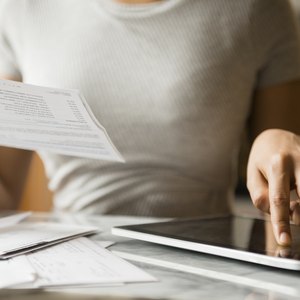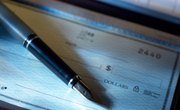
If you are due to receive an income tax refund check from the IRS, you have three basic options when it comes to getting the funds: You can apply your refund toward your estimated tax for the following year, have the amount directly deposited into your checking or savings account or have a paper check sent to you. If you decide on the last option, you can either deposit the check into your bank account or cash the income tax check at your bank. “Your bank” is key here. But the IRS does not have check cashing rules.
Cashing a Tax Refund Check
Even though a refund check is issued by the federal government, you can’t just walk into any bank and have the check cashed. You must have an account at that bank in order for the bank to cash your income tax refund. Even though you have an account at the bank and have had one for years, you’ll still need to show government-issued photo identification such as a driver license. before the bank will cash the check. If put through the ATM, a deposit hold could be possible.
Married Filing Jointly
If you are married and file taxes jointly, so that the names of you and your spouse appear on the income tax check, both of you must be present when the income tax check is cashed and both must have government-issued photo identification on hand. One party can’t cash the check alone or attempt to deposit it in an account that is not held jointly with their spouse. However, you can arrange with the IRS beforehand to have a joint income tax refund directly deposited into one or the other spouse’s accounts, but not a paper check.
State Income Tax Checks
What if you received a state income tax refund? Can you cash that check at the bank that issued it, even if you don’t have an account there? The answer is no. Banks have no obligation to cash checks for non-account holders, even if the bank issued the check and it is for state funds.
Tax Refund Scams
Why are the rules so strict when it comes to cashing income tax refund checks at banks, especially those in which you don’t have an account? After all, it’s not like the bank should be concerned that a federally issued check will bounce. But such checks are a major target for scammers. Basically, these criminals are using tax-related identity theft to target victims. A thief steals your Social Security number, then files a tax return to claim a phony refund. You may not realize this has occurred until you file your own return and discover someone else has already filed a tax return with your Social Security number to get your refund before you do.
Other Tax Refund Check Cashing Options
Many Americans don’t use personal bank accounts. Banks aren’t your only option for cashing an income tax refund check, although the other options require fee payments. Walmart is just one of many stores that offers check cashing services at low fees. While the normal limit for cashing a check at Walmart is $5,000, the amount rises to $7,500 during the period from January to April to accommodate income tax refund check cashers. There is one major catch for Walmart check cashing, however. You must have your taxes done at a participating tax preparer offering the service. The preparer gives you a code, which allows you to have the check cashed and protects against fraud.
Read More: When Can You Get That Tax Refund?
References
- IRS: Taxpayer Guide to Identity Theft
- Walmart: Cash Checks and Debit Cards
- New York State Department of Taxation and Finance: Individual Taxpayer Answer Center (Current Tax Year)
- Money.com: Now You Can Pick Up Your Tax Refund at Walmart
- Chase Bank. “Deposit Account Agreement and Privacy Notice,” Page 16. Accessed March 2, 2020.
- Experian. “Check Cashing: Are the Fees Worth It.” Accessed March 2, 2020.
- Federal Direct Insurance Corporation. “FDIC Consumer News: Beware of Fake Checks.” Accessed March 2, 2020.
Writer Bio
A graduate of New York University, Jane Meggitt's work has appeared in dozens of publications, including Sapling, Zack's, Financial Advisor, nj.com, LegalZoom and The Nest.

